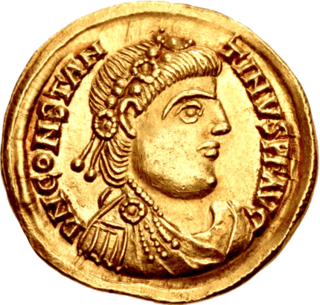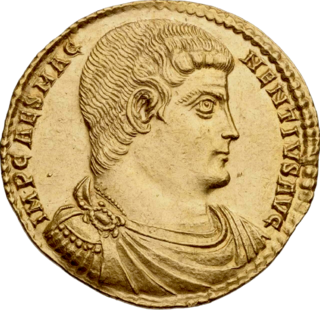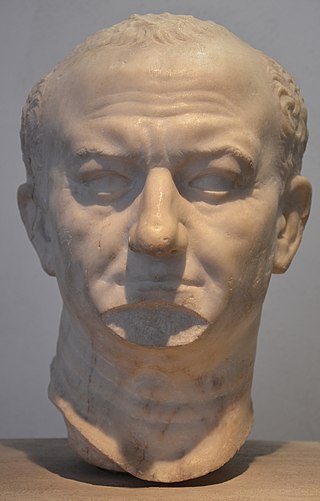Related Research Articles

Flavius Julius Constans, sometimes called Constans I, was Roman emperor from 337 to 350. He held the imperial rank of caesar from 333, and was the youngest son of Constantine the Great.

Constantine II was Roman emperor from 337 to 340. Son of Constantine the Great and co-emperor alongside his brothers, his attempt to exert his perceived rights of primogeniture led to his death in a failed invasion of Italy in 340.
The 330s decade ran from January 1, 330, to December 31, 339.
The 340s decade ran from January 1, 340, to December 31, 349.

Constantine III was a common Roman soldier who was declared emperor in Roman Britain in 407 and established himself in Gaul. He was recognised as co-emperor of the Roman Empire from 409 until 411.

Magnus Magnentius was a Roman general and usurper against Constantius II from 350 to 353. Of Germanic descent, Magnentius served with distinction in Gaul under the Western emperor Constans. On 18 January 350 Magnentius was acclaimed Augustus. Quickly killing the unpopular Constans, Magnentius gained control over most of the Western Empire. The Eastern emperor Constantius II, the brother of Constans, refused to acknowledge Magnentius' legitimacy and led a successful campaign against Magnentius in the Roman civil war of 350–353. Ultimately, Magnentius' forces were scattered after the Battle of Mons Seleucus, and he committed suicide on 11 August 353.

Constans II was the son of Western Roman emperor Constantine III, and served as his co-emperor from 409 to 411. Constans was a monk prior to his father being acclaimed emperor by the army in Britain in early 407, an act of rebellion against the ruling emperor Honorius. He was summoned to Gaul, appointed to the position of caesar (heir) and swiftly married so that a dynasty could be founded. In Hispania, Honorius's relatives rose in 408 and expelled Constantine's administration. An army under the generals Constans and Gerontius was sent to deal with this and Constantine's authority was re-established. Honorius acknowledged Constantine as co-emperor in early 409 and Constantine immediately raised Constans to the position of augustus (emperor), theoretically equal in rank to Honorius as well as to Constantine. Later in 409 Gerontius rebelled, proclaimed his client Maximus emperor and incited barbarian groups in Gaul to rise up. Constans was sent to quash the revolt, but was defeated and withdrew to Arles. In 410, Constans was sent to Hispania again. Gerontius had strengthened his army with barbarians and defeated Constans; the latter withdrew north and was defeated again and killed at Vienne early in 411. Gerontius then besieged Constantine in Arles and killed him.

The gens Flavia was a plebeian family at ancient Rome. Its members are first mentioned during the last three centuries of the Republic. The first of the Flavii to achieve prominence was Marcus Flavius, tribune of the plebs in 327 and 323 BC; however, no Flavius attained the consulship until Gaius Flavius Fimbria in 104 BC. The gens became illustrious during the first century AD, when the family of the Flavii Sabini claimed the imperial dignity.
Flavius Philagrius was a Roman state official under the emperors Constantine I and his son Constantius II. He served two terms as governor of Egypt, and finally as governor of Pontus in northern Anatolia. During his term of office in Egypt, he threatened and helped exile the trinitarian bishop of Alexandria, Athanasius, on behalf of the Arians, and throughout his career he acted in support of the Arian cause against adherents of the creed of Nicaea.
Flavius Constans was a general of the Eastern Roman Empire.
Flavius Taurus was a politician and a military officer of the Roman Empire. He was Praetorian Prefect of Italy and Africa, and consul in 361 AD.
Vulcacius Rufinus was a Roman politician, related to the Constantinian dynasty.
Flavius Ablabius or Ablavius was a high official of the Roman Empire and contemporary of Emperor Constantine I. and tutor to his son, Constantius II.
Flavius Eusebius was a Roman military officer and politician, and is usually identified as the posthumous father-in-law of the Roman emperor Constantius II.
Flavius Eusebius was a Roman Senator, who was the brother-in-law of the emperor Constantius II.
Flavius Hypatius was a Roman Senator, who was the brother-in-law of the Roman emperor Constantius II.
Ulpius Limenius was a Roman politician who was appointed consul in AD 349.
Olympias also known as Olympia, sometimes known as Olympias the Elder to distinguish her from her niece of the same name was a Christian Roman noblewoman, and a queen of Armenia by marriage to king Arsaces II. Through her father, Olympias was connected to the Constantinian dynasty and through marriage was related to the Arsacid dynasty of Armenia.
Seleucus also known as Flavius Seleucus and Count Seleucus was a wealthy Greek rhetor who was a close friend of Libanius and the Roman emperor Julian.
Flavius Romulus was a Roman politician, appointed to the high position of consul in 343. The historian Benet Salway tentatively identified him with Romulus, the senior army officer who fought and died for the usurper Magnentius at the Battle of Mursa in 351.